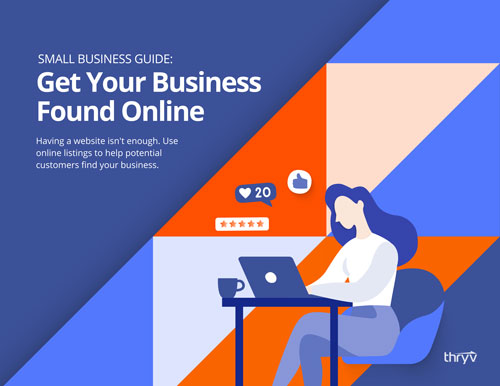Most customers discover a new business through local listings.
We take out our phones, Google “best places near me,” and scroll through a list of options in our area that can be filtered by location, business type, customer reviews – you name it.
So, how do you get your business featured in a local listing, and why is it worth taking the time to do it?
In this post, we’ll explain why local business listings are crucial to SMBs. Then, we’ll provide a breakdown of what you should include in your listing to get discovered on search engines, directory sites, social media, and more. Finally, we’ll wrap up with a list of services that will streamline your online listing management and make it easier to keep all of your listing up to date and accurate.

Online Listings Guide: Get Your Business Found
DownloadWhat is a local business listing?
A local business listing is a mention of your business or any of its contact information on a website, directory, social media channel, blog, or other online profile.
Simply put, local listings are these little boxes on Google when you search for a restaurant:

They’re also the Yelp profiles that you use to find the nearest mechanic:

They’re even the navigational maps that you use to drive your kids to soccer practice:

You get the point.
There are plenty of ways people can discover your business. So, let’s go over the local listings that are used most often and review some examples of each.
Types of Local Listings (+Examples)
Here are a few types of local listings:
1. Search Engine Results (Paid & Organic)
Whether it’s Google, Yahoo, Bing, or DuckDuckGo, search engines are an incredibly convenient way to discover a business. It can either be organic – your company ranks for a keyword, and the customer finds you by searching for that term – or it can be through paid campaigns – you pay to rank for a keyword, and the customer sees your ad at the top of their search results.
2. Directory Sites
Directory sites like Yelp, Yellow Pages, and Angi are used to connect customers who want to buy something right now from a local business. Most of these sites, like Yelp, are driven by customer reviews. The better your reputation is, the more your business stands out from competitors.
3. Social Media Profiles
Social media is a great place to build your online presence. Sites like Facebook, Instagram, and LinkedIn have plenty of business-centered features that can help your company gain followers and attract new customers.
4. Navigational Maps
Maps have become an integral part of how we discover new businesses. Think about it. When you visit a new place, you can use Apple or Google Maps, for instance, to search for companies in your area. You’re not just looking for addresses; you’re reading reviews, calling phone numbers, and even ordering takeout — all from the map interface.
Why are local listings important for small businesses?
Local listings are important for any business, but small businesses rely on them more than others. They play a huge role in local SEO and have a major impact on your online reputation.
Here’s an example of a strong local listing and what it provides for this business:
 This is a sporting goods store that I shop at a lot. How did I discover it? It’s listed on Google. It showed up right away when I searched “sporting goods near me,” and I can tell from the listing that this is a reputable business. It has a 5-star review from over 200 customers, and I can see all the services the shop provides. It also has a link to its website, and I can clearly see the phone number and operating hours.
This is a sporting goods store that I shop at a lot. How did I discover it? It’s listed on Google. It showed up right away when I searched “sporting goods near me,” and I can tell from the listing that this is a reputable business. It has a 5-star review from over 200 customers, and I can see all the services the shop provides. It also has a link to its website, and I can clearly see the phone number and operating hours.
As a new customer, this business listing is very enticing. It not only provides information about the business, but also builds up my perception of the company through images, star reviews, and customer testimonials.
This video goes into more detail about why local listings matter:
What information should my business provide?
At this point, you might be pulling up Google and logging into your business profile. Before you’re off and running, be sure to gather the following information on your business. This will come in handy regardless of the type of listing you’re creating.
- Business Name
- Business Description
- Business Category
- Address
- Phone Number
- Website URL
- Social Media Profiles
- Email Address
- Images
- Hours of Operations
- Payment Options
- Customer Reviews
If you’re running a small business, you might not have time to track down every listing option available – never mind having the time to upload all your information manually.
This is where a local business listing service comes into play. Here are a few options to consider if you want to improve your online listing management.

Get Your Business
Found Online
Are you ready to get serious about your online listings?
Local Business Listing Services
1.Hibu
Best For: Vocal Search Listings

Hibu is a marketing service that takes complete control of your local business listings. It makes sure listings are up to date and feature accurate information. One of its premier features is its vocal search services, which help make your company discoverable on devices like Siri, Alexa, and Google.
Pricing: Request a Quote
2.Thryv
Best For: All-in-One Reputation Management

Thryv is an all-in-one platform intended for small businesses. One of its best features is its online listings management solution, which allows users to oversee and update more than 40 different local listing sites at once. Thryv also provides tools that help you manage your Google Business Profile, so you not only get discovered by new customers, but make it easy for them to contact you. In short, Thryv helps you increase your visibility across multiple listing sites without adding more work to your day.
Pricing: Starts at $200/month
3. Fiverr
Best For: Quick/Short-Term Listing Requests

Fiverr is used to hire freelancers and various other contractors. If you need immediate assistance or are just looking for a short-term solution, you can search Fiverr for individuals who offer listing management services. The risk you run is that you’re outsourcing the job to someone who might not be familiar with your business, and might not know which channels or information are most relevant to your customers.
Pricing: Starts at $5
Getting Your Business Listed Online
Whether it’s through a listing service or doing it on your own, it’s important to keep your listings accurate and up to date. Customers use all sorts of directory sites and providers, so you want to ensure they find all the information needed to contact your business, regardless of where they’re looking. If you don’t have time to manage your online presence, consider adopting one of the tools above to streamline your workflow and enhance your listing management.

Get Your Business
Found Online
Are you ready to get serious about your online listings?






